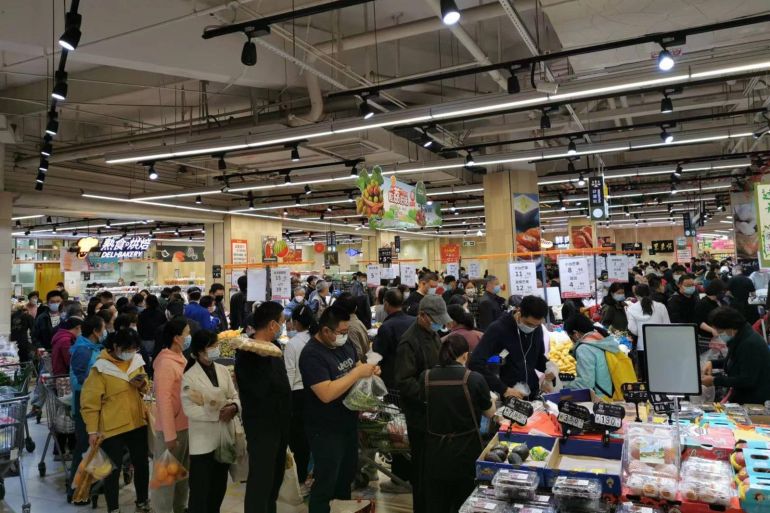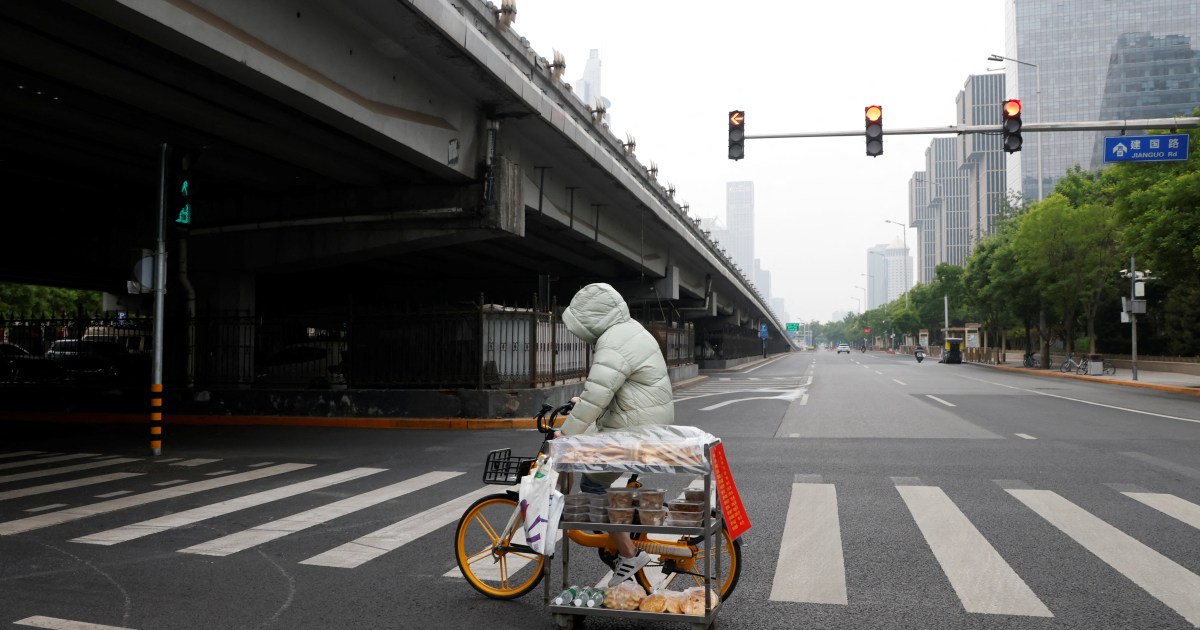China’s small businesses buckle under lockdowns, as expats exit | Coronavirus pandemic
Beijing, China – For Li Pei, keeping two businesses running during China’s lockdowns has been no easy task.
At Li’s solar panel business in Shanghai, staff have been working remotely to achieve sales quotas since the city went into lockdown in late March. Meanwhile, Li’s kindergarten in Beijing’s Haidian district is temporarily closed, after already struggling for months to attract new students following last year’s announcement of the “double reduction” policy, which aims to ease pressure on students by restricting private tutoring and after-school institutions.
Stuck at home without work, Li’s teachers are being tested daily for COVID-19 until at least Wednesday, following district authorities’ announcement of mass testing in urban districts over the weekend.
“I have the same question as everyone else,” Li, who asked to use a pseudonym, told Al Jazeera. “‘Should I continue [my business] or just close it entirely?’ How can the government support small and medium enterprises? Without clear rules, we are shrouded in uncertainty.”
Li is among the millions of small business owners and entrepreneurs across China who are bearing the brunt of Beijing’s “dynamic zero COVID policy”, which has put the economy in its most precarious position since the start of the pandemic.
Retail sales and industrial production in April fell 11.1 percent and 2.9 percent, respectively, according to official data released on Monday, their lowest levels since early 2020.
Community-level transmission
“If the government manages to end the current wave fairly soon, the question now is whether they still have the time to pump up infrastructure investment to the level necessary to generate something close to the gross domestic product [GDP] target,” Michael Pettis, a finance professor at Peking University, told Al Jazeera, referring to Beijing’s ambitious goal of 5.5 percent growth in 2022.
In Beijing, authorities have shut down much of the city, even as they insist the capital is not headed for a Shanghai-style lockdown, as they struggle to contain an outbreak of the highly transmissible Omicron coronavirus variant.
On Sunday, Fengtai district, the site of the latest infection cluster, announced the closure of gyms, indoor recreational venues, and training centres.
Municipal health authorities said on Sunday that community-level transmission had “not been cut off” amid persistent clusters, including a number linked to a courier company in Fangshan district, a group of bus drivers, and a railway construction company.
Authorities have advised residents in Fengtai, Chaoyang, Shunyi, and Haidian districts – home to almost 10 million people combined – to continue working from home.
With no end in sight to harsh restrictions in the capital, business groups have warned of the effect of prolonged lockdowns on their operations.
In a survey carried out last month, the British Chamber of Commerce in China (BritCham) said 55 percent of respondents had “either delayed or decreased investments” due to pandemic-related disruptions since mid-March.
“It is crucial for enterprises and individuals to prepare for a potential slowdown in business, ensuring appropriate infrastructure to assist a remote work set-up and increasing warehouse stock to accommodate potential supply issues,” Alexandra Hirst, a policy analyst at BritCham, told Al Jazeera.

The uncertainty about the path ahead has spooked individual consumers, too.
On Thursday, Beijing residents stormed supermarkets following online rumours of a three-day citywide lockdown and the temporary suspension of food delivery and courier services.
The panic buying came in spite of authorities’ efforts to deny the rumours and reassure the public there were adequate supplies of food in place.
Eva Williams, who is leaving China in July after 12 years as an expat, said she immediately took a deep breath upon hearing the rumours because “having to go to a total lockdown could have sent me into a panic”.
“I was very relieved that the lockdown did not happen,” Williams, who works as a principal at an international school in the city centre and asked to use a pseudonym, told Al Jazeera. “I am moving out and there are certain requirements and paperwork that I need, so a part of me goes, ‘If you want to do something, do it now and get it done.’ I’m sure many people who will leave soon are thinking the same.”
The American Chamber of Commerce in China (AmCham China) said recently it is “bracing for a mass exodus of foreign talent this summer”, while “fewer employees overseas [are] willing to take up open positions in China.”
“For two years, we have strongly advocated for an easing to business travel restrictions, there have been some improvements, but, today, it’s still as hard as ever to travel to China,” AmCham China Chairman Colm Rafferty said following the release of a flash survey of its members earlier this month.
Beijing-based financial consultant John Curry said the expat exodus is affecting individuals more than foreign businesses.
“The vast majority of these foreign businesses are still Chinese – so it is still more homegrown talent,” Curry told Al Jazeera.
“The policy decisions will have more real impact. But what happens in Beijing will depend on the direction of the ‘zero COVID policy.’ The situation is still volatile, so I think the status quo will remain until the end of this year.”
‘Barely manage’
Earlier this month, China’s Cabinet pledged to roll out policies to support firms and help ease unemployment during a State Council meeting chaired by Premier Li Keqiang. Beijing has also promised to assist with securing foreign orders and providing loans, in addition to keeping the yuan stable, to support foreign trading firms.
While waiting on more concrete government policy announcements and support, struggling business owners like Li are weighing the future of their enterprises.
Despite delivery problems, Li’s solar panel business in Shanghai has been able to stay above water by sourcing materials from suppliers in provinces without stringent COVID rules.
“But the losses in my Beijing kindergarten are hitting us hard,” Li told Al Jazeera. “We barely manage to continue, but we still do it because of the scholars we support.”
“As a business owner, I have to convince my investors to back me up because they have trusted me and believed in my vision,” Li added. “But at the end of the day, I still have to make decisions – and my decision for now is to move forward based on the facts that I have and the hope that we will get out of this misery soon.”




